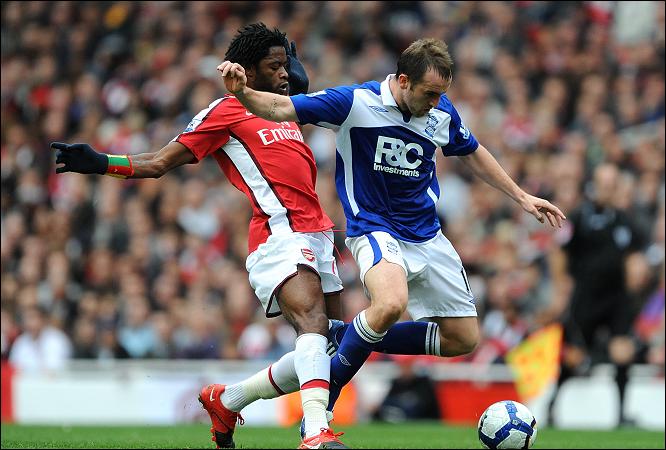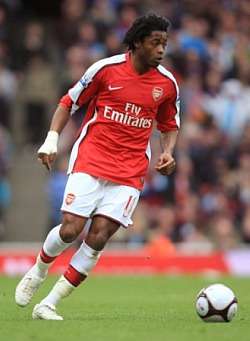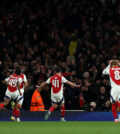- Arsenal battling with Liverpool to sign Igor Paixao
- Arsenal remain keen on signing Ajax star Jorrel Hato
- Arsenal battling with PL rivals to sign Eberechi Eze
- Arsenal plan summer move for Boubacar Kamara
- Player ratings: Arsenal 3-0 Real Madrid: Declan Rice stuns champions
- Arsenal ‘preparing’ to submit formal bid to sign Arda Guler
- Arsenal battling with Man Utd to sign Matheus Cunha
- Confirmed line-ups: Arsenal vs Real Madrid – Saka & Martinelli start
- Arsenal target Rafael Leao to boost attack
- Arsenal prediction line-up against Real Madrid
Cesc Fabregas’ Secret Weapon
 Our regular Guest Contributor, Ted Harwood, takes a look at Cesc Fabregas’ secret weapon, Alex Song, and his emergence this season as one of the best defensive midfielders in the Premier League. Song’s form is directly related to Cesc’s performances this season of 10 assists in 10 league matches, just one less than the total that led the league last season, as well as his 9 goals in all competitions. His confidence going forward is down to his confidence in Song. You get the sense that he is inspiring the same sort of confidence that Flamini did 2007-08, and it also shows how important the DM spot is to Arsenal’s style of play.
Our regular Guest Contributor, Ted Harwood, takes a look at Cesc Fabregas’ secret weapon, Alex Song, and his emergence this season as one of the best defensive midfielders in the Premier League. Song’s form is directly related to Cesc’s performances this season of 10 assists in 10 league matches, just one less than the total that led the league last season, as well as his 9 goals in all competitions. His confidence going forward is down to his confidence in Song. You get the sense that he is inspiring the same sort of confidence that Flamini did 2007-08, and it also shows how important the DM spot is to Arsenal’s style of play.
Alex Song is a player that has shown lots of potential since arriving on the scene at the Emirates in 2005. He made sporadic appearances during his first year before going on load to the Addicks at the start of 2007. Upon his return to the club in the fall of 2007, Song began to log significant time at both central midfield and center half in the Carling Cup and the Champions’ League.
Despite being named in the African Cup of Nations best XI in January of 2008, many Arsenal supporters remained unconvinced, some claiming that Song was too slow for the Premier League, some claiming that he was not confident enough, many saying that the club should have sold Song rather than Diarra (hopefully those same folks have at least changed their stance on that, now). This season, at only 22 years of age, Song has really settled well into the defensive midfield slot of Arsenal’s new 4-3-3 formation and has been playing the game with verve, gaining much of that confidence that was perhaps a worry a couple of years ago for him.
With the help of the superb resource that is The Guardian Interactive Chalkboards, I took a look at all of Song’s performances in the league this season so far (every match bar the Pompey triumph). The chalkboards confirmed what I had seen with my eyes and tried to piece together in the shoddy, ramshackle cabin that is my memory: Song has been, with one or two unfortunate exceptions, rock solid in front of the back four.
One of
Clearances have been a bit of a problem, with The Guardian’s staff deeming many of Song’s clearances to be “unsuccessful” (it is unclear what this means, exactly), but further investigation revealed that this has been a bit of a concern for the entire team, not just Song. I’m sure that Wenger will have seen this in film review, and will take steps to make sure that when in danger, Arsenal do a more effective job of putting the ball as far away as possible.
Song’s tackling has been excellent, and, like his passing, he’s been nicking the ball away from opponents all over the field, left, right, and center. On a couple of occasions (e.g. the Tottenham match) he has lost challenges in delicate positions, and the unfortunate penalty (if one can call it that) at Upton Park could maybe have been prevented with an earlier challenge by any number of Arsenal players . Overall, Song has been the team’s best and busiest tackler. In the Wolves game last weekend, things were pretty hairy for the first 20 minutes, and when Song came in, one could sense that Ramsey in particular relaxed, relieved of the heavier of his defensive obligations, and began to play his game.
It is this last point that is most important; Song has seemingly gained the absolute confidence of his teammates. It is no secret that the creative players in a 4-3-3 need to have faith that if they concentrate on setting up attacking moves, should something go wrong, there is a player nearby who will help them to sweep away the danger. Much of the success that Cesc, Diaby, Ramsey, Eboué, and Rosicky are enjoying this year is due to the reassurance that Song will at least slow up and at most destroy any counterattacks that may come down the field. Song’s impact on the side was plain to see in the Wolves match when Arsenal struggled for the first 20 minutes until he came on.
The 2010 edition of the African Cup of Nations presents a new dilemma for Wenger with regards to Song. In 2008, Wenger compounded the effect of Song’s absence by also selling Diarra, which left Arsenal a little thin in defensive positions behind Flamini at times and perhaps factored into the teams’ growing misfortunes as the season progressed from there. This year, Wenger will no doubt have learned from 2008. The fact that he did not bring in cover for Song’s absence in the August window may tell us something. Transfer options, though, would appear to be limited or unrealistic; surely Yaya Touré would not come to Arsenal to plop back onto the pine as February rolls around. Vieira remains, as always, a sentimental choice, but playing time is crucial for him as well in advance of June and the World Cup.
As in central defense, the problem is that one has to find a player who is better than the backups we currently have but not worried about being on the bench when Song returns. Internal options would appear to be more realistic, if not necessarily preferred, although the options we have are perhaps better than people think. Although Denilson is a different type of player, he achieves similar results to Song with his passing and breaking up of play via interceptions and the occasional tackle. His form may still be a slight concern in six weeks’ time, though, and Wenger may see him as a forward-thinking central player at this point.
Another intriguing option, although it is hard to imagine Wenger doing this, is moving Vermaelen into Song’s position and placing either Senderos or Silvestre in the back four. I am not convinced that this is an option, really, as Wenger will no doubt see Vermaelen’s aggression as key to the back four’s attitude this year. As much as Vermaelen seems to offer going forward, if it were a larger part of his job, it is hard to judge whether he would pull it off.
Craig Eastmond played very well versus Liverpool in the Carling Cup tie, but may lack for experience. This has not always stopped Wenger in the past, though; Ramsey, for instance, played in the defensive slot for the first time in my memory on Saturday, so we cannot say that Wenger would not try Eastmond there at some point (although, to be fair, Ramsey has more big-match experience). And Wenger may just try Ramsey there again. He seems to have eliminated Diaby from his defensive plans, admitting that the Frenchman has a bit of a nose for goal, and that this causes him to neglect his holding obligations from time to time.
Song’s form this year will be difficult to replace during his absence, but Wenger will no doubt have anticipated this problem this year and have any number of options in his mind. One thing is for sure, though, and that is that Song is quickly developing into one of the better defensive midfielders that Arsenal have had since Vieira left, and hopefully this (at one time, anyhow, pleasantly surprising) development will carry over to other young players in the squad.

 Our regular Guest Contributor, Ted Harwood, takes a look at Cesc Fabregas’ secret weapon, Alex Song, and his emergence this season as one of the best defensive midfielders in the Premier League. Song’s form is directly related to Cesc’s performances this season of 10 assists in 10 league matches, just one less than the total that led the league last season, as well as his 9 goals in all competitions. His confidence going forward is down to his confidence in Song. You get the sense that he is inspiring the same sort of confidence that Flamini did 2007-08, and it also shows how important the DM spot is to Arsenal’s style of play.
Our regular Guest Contributor, Ted Harwood, takes a look at Cesc Fabregas’ secret weapon, Alex Song, and his emergence this season as one of the best defensive midfielders in the Premier League. Song’s form is directly related to Cesc’s performances this season of 10 assists in 10 league matches, just one less than the total that led the league last season, as well as his 9 goals in all competitions. His confidence going forward is down to his confidence in Song. You get the sense that he is inspiring the same sort of confidence that Flamini did 2007-08, and it also shows how important the DM spot is to Arsenal’s style of play.







13 Comments